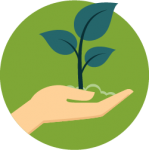Sustainability to feed the planet
LG Biotecnologie has a strong agricultural vocation. Microalgae are vegetable organisms that are grown with a method between agriculture and aquaculture. They are not bred, but cultivated, exactly like other more common vegetables. Performing photosynthesis, microalgae grow thanks to solar irradiation, nutrients found in water and the typical movement of water, which we replicate at zero cost, getting energy from the photovoltaic panels that cover the greenhouses. Our cultivation method avoids to ruin the characteristics of our microalgae, achieving a product rich in all the naturally occurring nutritional components.
Microalgae have a potential, still largely unexpressed, for mankind, for animals and for nature. In fact, they are able to convert CO2 and solar energy into essential fatty acids (omega3, 6, 9), proteins, carbohydrates, vitamins and minerals. Thanks to their nutritional content they have considerable benefits on human and animal health. By feeding on nitrates and phosphates, which are highly polluting for the environment, microalgae can also be used to reduce contaminants in liquid waste from farming or biogas production. This allows a double and positive result: the production cycle is more sustainable and the negative externality of pollutants is converted into microalgae that can be used in agricultural and zootechnical processes.
Zero Impact Production
Our production starts from solar irradiation, that has a double role: it allows the microalgae to grow (thanks to the photosynthesis) and the production plant to reproduce the water movement that is vital for the growth of microalgae, thanks to the photovoltaic system that converts the solar irradiation into electricity.
Microalgae are the most sustainable source of protein, as they do not consume water to grow. In fact they use water to move, but they do not use it as an intake for themselves, hence they do not consume it.
Thanks to the use of nutrients coming from phytodepuration, LG Biotecnologie is able to be 100% sustainable and free from water consumption, in a process in which every step output is the input of the next one.
Some LG Biotecnologie facts in pills
Milk production*
*Cows receiving dietary Spirulina had a 21% increase in their milk production (Kaunas University, 2007)
cows body condition*
* Body condition in dairy cows with 1.5% of spirulina in diet. (Kulpys et al., 2009)
daily growth of pigs*
*Pigs supplemented with Spirulina have a +15% average daily growth of the body. (Simkus, A. et al, 2013)
COOPERATIVA PRODUTTORI ARBOREA grows livestock, mainly ruminants and pigs, for milking and quality meats. The cooperation with Arborea is oriented to further investigate the effects of microalgae on the level of productivity and quality of milk and meat produced. Past studies have evidenced that diets enriched with microalgae have positive effects on the growth and on the quality of milk and meet in ruminants, pigs, poultry and rabbits. The present cultivation technology of microalgae needs some improvements to reduce costs. In this case, the liquid digestate from livestock wastewaters may be used as an alternative source of nutrients for the microalgae. Thanks to this collaboration, Arborea will be able to lower the negative externalities of its activity and LG Biotecnologie will have a natural and sustainable source of nutrients for the microalgae.
CONTINI is a high quality winery that uses the best grapes of TERRE DI OSSIDIANA to produce a wide range of wines. At the moment the organic agriculture is experiencing an annual growth rate of 15-20% in certain areas of Italy, with positive outlook for the forthcoming years. The collaboration with Contini and Terre di Ossidiana is oriented to investigate the effects of microalgae as bio-stimulants and bio-fertilizers. In fact microalgae contain high-value components that are ideal to be used as biostimulants and biofertilizers. Green microalgae, as chlorella, are able to produce substances that regulate vegetable growth. Cyanobacteria, as spirulina, are more efficient in fighting fungus illnesses of plants.
Keep in touch.
If you have further questions or requests, use the form below.






















